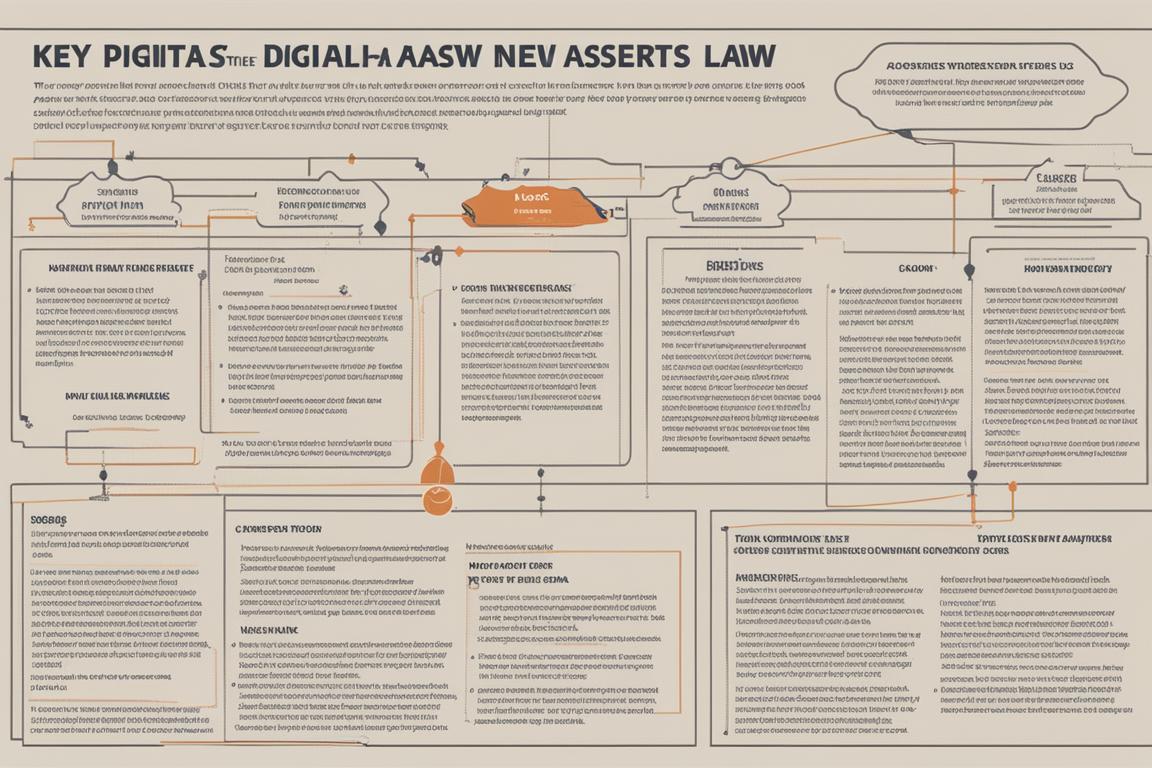In an era where digital transformation dictates the pace of global financial markets, the United Arab Emirates (UAE) stands at the forefront, introducing a groundbreaking legal framework for digital assets. This move not only positions the UAE as a pioneering force within the cryptocurrency domain but also opens up a realm of possibilities and considerations for High Net Worth Individual (HWNI) expatriates residing in the region. The implications of this new legislation are vast and multifaceted, affecting everything from individual investment strategies to the operational frameworks of financial institutions and businesses involved in the digital asset space.
Legal Framework for Digital Assets in UAE
By reading this article, you will learn:
– Definition and significance of digital assets
– Overview of the new UAE law on digital assets
– Impact of the new law on individuals, businesses, financial institutions, and various entities in the crypto space
What is a digital asset?
Before we delve into the intricacies of the new law, it’s crucial to understand what constitutes a digital asset. Broadly speaking, digital assets encompass cryptocurrencies like Bitcoin and Ethereum, digital tokens, non-fungible tokens (NFTs), and other blockchain-based assets. These assets represent a digital form of value or rights that can be bought, sold, exchanged, or held as an investment.

What is the new law?
The UAEs newly introduced legal framework for digital assets is a comprehensive set of regulations designed to oversee the burgeoning sector of cryptocurrencies and blockchain technology. This law aims to establish a secure and robust legal environment that fosters innovation while protecting investors from the potential risks associated with digital asset transactions.
What does the new law mean for me?
For HWNI expats in the UAE, this new legal framework signifies a pivotal shift in the investment landscape. It offers a regulated environment for engaging with digital assets, providing a layer of security and legitimacy that was previously lacking. This means that individuals can now invest in, trade, and manage digital assets within a legal structure that safeguards their interests and investments.
What are the key points of the new law?
The new legal framework outlines several key points that are critical for investors to understand:
- Licensing Requirements: Crypto exchanges, custody providers, and other digital asset service providers must obtain licenses to operate legally within the UAE.
- Investor Protection: The law includes provisions designed to protect investors from fraud, market manipulation, and other unethical practices.
- Anti-Money Laundering Measures: Strict anti-money laundering (AML) and counter-terrorism financing (CTF) regulations are integrated into the legal framework to prevent misuse of digital assets.

What are the penalties for breaking the new law?
The penalties for non-compliance with the new digital assets law are stringent, underscoring the UAE government’s commitment to maintaining a clean and secure digital asset market. Violations of the law can result in hefty fines, suspension of licenses, or even criminal charges, depending on the severity of the offense.
How does the new law affect businesses?
For businesses, especially those operating within the fintech and blockchain sectors, the new law offers a clear regulatory roadmap for integrating digital assets into their operations. Companies can now leverage digital assets for various purposes, including fundraising through Initial Coin Offerings (ICOs) or using blockchain technology for operational efficiencies, within a regulated framework.
How does the new law affect financial institutions?
Financial institutions in the UAE, including banks and investment firms, now have the opportunity to incorporate digital assets into their product offerings and investment portfolios. This could lead to the development of new financial products and services centered around digital assets, expanding the investment options available to clients.
How does the new law affect financial markets?
The introduction of a legal framework for digital assets is expected to catalyze the growth of the UAE’s financial markets by attracting digital asset companies and fostering innovation. This could enhance liquidity, diversify investment portfolios, and contribute to the overall dynamism of the region’s financial ecosystem.
How does the new law affect crypto exchanges?
Crypto exchanges operating in the UAE must now navigate a regulated landscape, which includes obtaining the necessary licenses and complying with AML/CTF regulations. While this may pose operational challenges, it ultimately legitimizes their business, potentially attracting more users and investments.
How does the new law affect crypto custody providers?
Custody providers play a crucial role in the digital asset ecosystem by ensuring the safekeeping of digital assets. Under the new law, these entities are subject to licensing requirements and must adhere to specific security and operational standards, enhancing the overall integrity of the digital asset market.
How does the new law affect crypto asset managers?
Crypto asset managers in the UAE will find that the new legal framework provides a structured environment for offering asset management services related to digital assets. This includes managing portfolios of digital assets on behalf of clients, subject to compliance with the regulatory requirements outlined in the law.
How does the new law affect crypto investment funds?
The new legal framework presents an opportunity for the establishment of crypto investment funds in the UAE. These funds can now operate within a regulated environment, offering investors a new avenue for diversifying their investment portfolios with digital assets.
How does the new law affect crypto derivatives providers?
Providers of crypto derivatives, such as futures, options, and swaps, will need to comply with the new legal requirements, including obtaining the appropriate licenses. This regulation aims to ensure transparency and fairness in the trading of crypto derivatives, protecting investors from undue risks.
How does the new law affect crypto asset tokenisation platforms?
Tokenisation platforms, which enable the conversion of assets into digital tokens, are poised to benefit from the new law. By operating within a regulated framework, these platforms can offer tokenisation services with greater confidence and security, potentially revolutionizing the way assets are owned and traded.
How does the new law affect crypto asset trading platforms?
For crypto asset trading platforms, the new law establishes a legal basis for their operations, requiring adherence to licensing and regulatory standards. This not only legitimizes their services but also provides a safer environment for traders and investors.
Real-life Impact: Understanding the New Law
John, a freelance crypto trader in the UAE, has been closely following the developments in the digital assets space. With the introduction of the new digital assets law, he found himself in a position to navigate through the changes and understand the impact on his trading activities.
Navigating Compliance Challenges
John realized that the new law brought about a set of compliance requirements that he needed to adhere to as a crypto trader. This meant understanding the licensing and registration procedures, as well as ensuring that his trading activities were in line with the regulatory framework.
Access to New Opportunities
While initially concerned about the regulatory changes, John also saw the potential for increased confidence and participation from institutional investors in the digital assets market. This presented new opportunities for collaboration and growth within the industry.
Adapting to Evolving Standards
As the law set new standards for crypto exchanges and asset managers, John had to adapt to the evolving landscape. This meant staying informed about the legal obligations and best practices to ensure continued success in his trading endeavors.
John’s experience highlights the practical implications of the new digital assets law, shedding light on the real-life impact and adjustments that individuals and businesses need to make in response to the regulatory changes.
How does the new law affect crypto asset custodians?
Crypto asset custodians, responsible for the secure storage of digital assets, will find that the new law underscores the importance of their role in the ecosystem. Compliance with the law ensures that custodians meet high standards of security and reliability, fostering trust among investors.
Insider Tip: “The UAE’s new legal framework for digital assets is a game-changer for the region’s financial landscape. It’s crucial for HWNI expats to understand the nuances of this law to navigate the digital asset market effectively.” – Financial Expert in Dubai
In conclusion, the UAE’s new legal framework for digital assets marks a significant milestone in the integration of digital currencies and blockchain technology into the mainstream financial ecosystem. For HWNI expats, this presents both opportunities and challenges. Understanding the implications of this law is paramount for making informed investment decisions and capitalizing on the potential of digital assets. As the landscape continues to evolve, staying abreast of legal developments will be key to navigating this exciting and dynamic domain.
Explore further insights and opportunities in the UAE:
- Explore the Best Investment Opportunities in Dubai for HWNI Expats
- Top Charitable Organizations in Dubai and UAE
- Top 10 Investment Opportunities in Dubai for 2023
- Expat Taxation and Legal Issues
- Discovering the Most Luxurious Residential Areas to Live in Dubai
Frequently Asked Questions
Q: Who regulates digital assets in the UAE?
A: The Securities and Commodities Authority (SCA) regulates digital assets in the UAE.
Q: What is the legal framework for digital assets in the UAE?
A: The UAE has introduced regulations to govern digital assets, including cryptocurrencies and ICOs.
Q: How can individuals and businesses comply with UAE’s digital asset laws?
A: Individuals and businesses can comply by registering with the SCA and adhering to the established regulations.
Q: What if I don’t comply with the digital asset laws in the UAE?
A: Non-compliance could result in penalties, fines, or legal action by the authorities.
Q: How does the legal framework in the UAE protect digital asset investors?
A: The legal framework aims to provide transparency, security, and investor protection within the digital asset market.
Q: What are the objections to the legal framework for digital assets in the UAE?
A: Some may raise concerns about the complexity of compliance, but it’s crucial for maintaining a secure market.